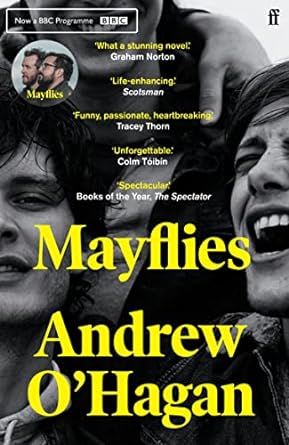Mayflies, Andrew O’Hagan

January 2024
Breaking with tradition to read a book by…gasp…a man.
I didn’t set out to cancel male authors from my reading when, seven years ago, I dedicated the year to reading books by women. The fact was that I gravitated towards female authors already, and this was (and is) compounded by the people I follow recommending books by women.
Often, when people do an ‘experiment’, they mean for it to lead them off their typical path, towards something new. It might be something hard, or exciting, radical or random. But it is usually designed to test, whereas I chose something designed - if inadvertently, certainly innocently - to embed my existing habits and amplify my echo chamber.
This was a mistake. I should have read further and wider. The challenge to read more women, was for readers who didn’t already veer that way. Not for card-carrying men-suspicious feminists like me! I’ve had a ride, a riot. But I need to think deeper and harder.
I’ve hardly gone wild here. Clearly Andrew O’Hagan’s Mayflies, chiefly a book about male friendship in the face of death, featuring working class Scottish characters who bond over dysfunctional families and a love of music and grow up to pursue literary interests, by one of the UK’s most successful writers, isn’t a radical departure from my typical tastes in fiction, but it has reminded me to get outside of myself.
I don’t mean to advise anyone to read books they don’t wish to read, to feel compelled to confront our overwhelmed minds with even more of the horrific and the grotesque, or just plain exhausting, voices and ideas and actions that fill our feeds and thoughts. I read for all sorts of reasons, including entertainment and escapism, comfort and indulgence, to pass time and to bolster all manner of judgements and beliefs I hold avbout the world and ‘other people’. But I have always also read to discover and to learn, even if these things aren’t always easy. Reading Mayflies was a timely reminder to look outside of myself, and beyond my own circle and ideals, to seek deeper understanding of the human condition.
What else is there?